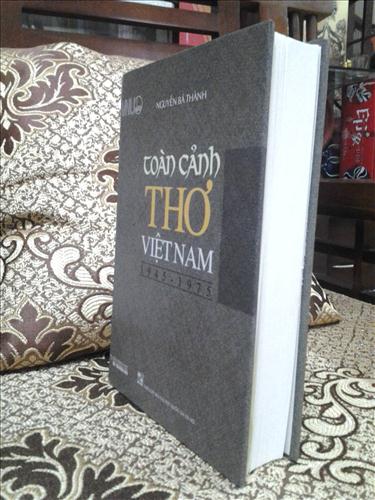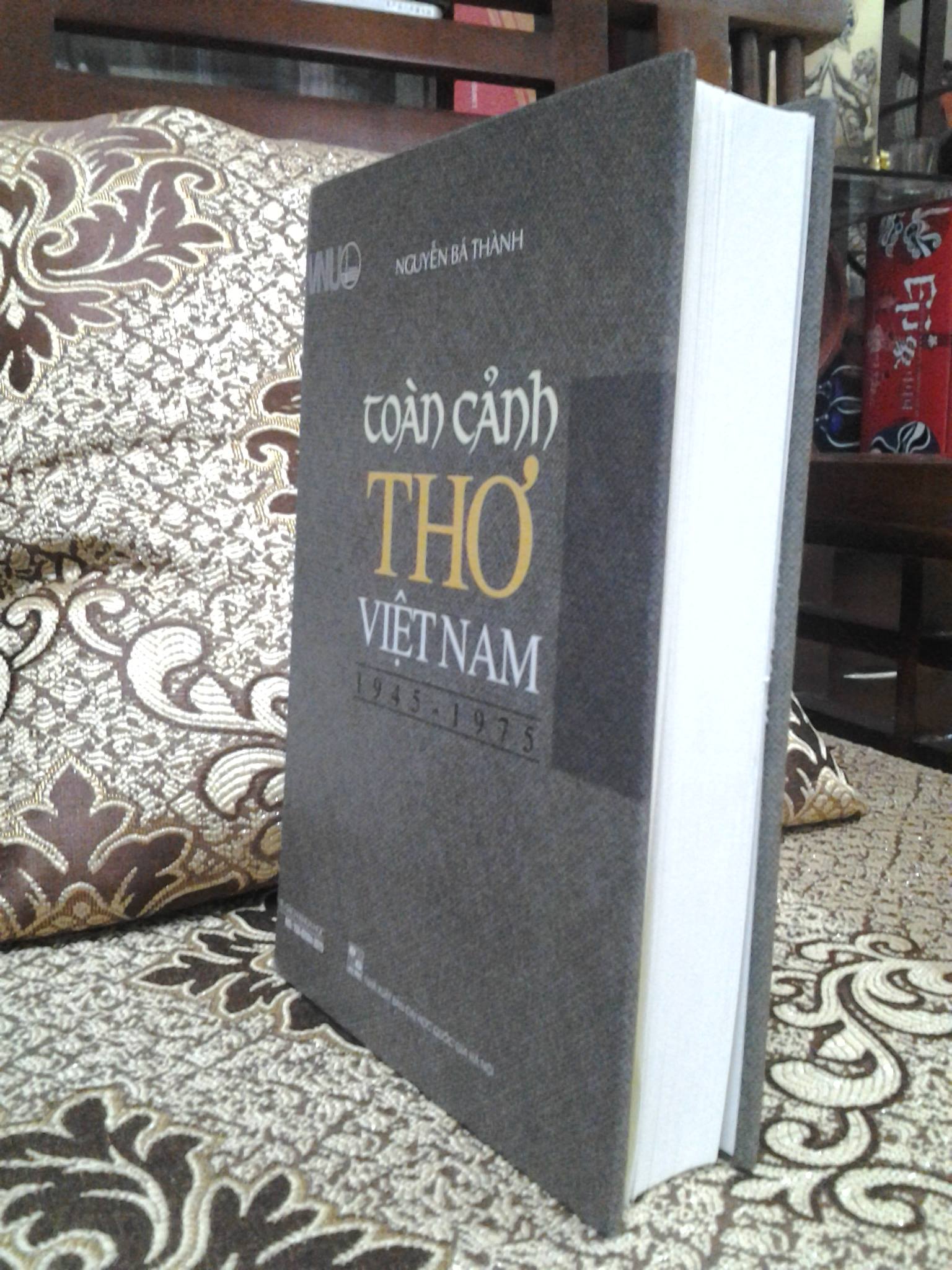
(ReadAn overview of Vietnamese poetry from 1945 to 1975(A treatise by Nguyen Ba Thanh, National University of Hanoi Publishing House, 2016)
1.This is arguably the first comprehensive, insightful, and engaging treatise on Vietnamese poetry during the memorable historical period of 1945-1975. We anticipate significant and often conflicting opinions surrounding this work, but it's a positive sign as we strive to abandon one-sided, simplistic, and superficial thinking in response to any event in social and literary life. It must be said that to complete this monumental work, our colleagues invested considerable time, effort, and money in collecting and acquiring a massive body of material—thousands of pages—not only from Vietnam but also from countries across Asia, Europe, and America (such as Japan, France, Italy, the Netherlands, Belgium, and the United States). However, much effort can yield meager results if we continue to follow old habits and methods, meaning we remain infatuated with our own traditions. It can be said that for the first time, Vietnamese poetry from the 1945-1975 period is being recognized as a unified, diverse, and complex poetic entity, shaped by the political climate and historical changes of the turbulent 30 years of revolution and war, in the context of a country divided for 21 years, and within a single period where multiple different, mutually exclusive political regimes existed on the same territory. For a long time, research has been constrained by somewhat rigid viewpoints, leading scholars to confine Vietnamese poetry from 1945-1975 to revolutionary poetry, poetry composed within the political and cultural sphere of the Democratic Republic of Vietnam. This approach is not wrong, but it is insufficient, one-sided, lacking objectivity, and even unfair. If this continues, future generations will only have a limited understanding of Vietnamese poetry.incomplete poetry- This means that only fiery, passionate verses of struggle are present, lacking the heartfelt, multifaceted voices of the entire Vietnamese community from North to South, all descendants of the Dragon and the Immortal. It can be said that for the first time, the author of this work has opened the door to national poetry during the most painful, tragic, proud, yet also diverse, rich, and complex period in the history of modern Vietnamese poetry in the 20th century. More precisely, the work demonstrates a spirit of innovation in literary research, for example, by not attempting to "dethrone" the New Poetry movement of 1932-1945, but rather repositioning it on the modern poetic stage through a serious, scientific comparison with Vietnamese poetry from 1945-1975: "But if we look from a holistic perspective, considering all parts, schools, and regions, we will have an optimistic view, a completely different assessment."That Vietnamese poetry from 1945-1975 was the most brilliant, freest, and most successful period of its development."The New Poetry Movement (1932-1945), in terms of both quantity and artistic quality, considering the significance of poetry to the spiritual life of society, in terms of author types, lyrical character types and central imagery, as well as the modernization trend in language and poetic symbolism… cannot be compared with the achievements of poetry from 1945-1975" (p. 44). We anticipate that this opinion from the researcher will provoke an emotional reaction from the literary theorists and critics who have long been reluctant to abandon their biased beliefs when assessing the progress and typical phenomena of literature.
2.The monograph comprises four major chapters: Chapter 1/Conceptions of Vietnamese Literature 1945-1975 as a Whole; Chapter 2/Poetry under the Democratic Republic of Vietnam; Chapter 3/Poetry under the State of Vietnam and the Republic of Vietnam; Chapter 4/Common Characteristics of Vietnamese Poetry 1945-1975. Thus, it can be seen that the content of chapters 1, 3, and 4 reflects the serious professional work of the researcher in the spirit of innovation – integration with the modern world is only possible when we are truly unified from within, specifically in terms of culture and literature. More broadly, national spirit and intellect also need to be built on a foundation of organic unity. This is our inherent strength not only in the field of art but also in politics, economics, culture, and ethics. To create a compelling structure for the study, the researcher simultaneously applied the combined strength and maximum effect of various research methods (typology, sociology, cultural studies, poetics, etc.). However, the most important factor for the researcher to delve into the structure of a unified poetic tradition, in a scientific spirit, is approaching Vietnamese poetry from 1945-1975 from the perspective of artistic thought. As a prerequisite for the study of Vietnamese poetry from 1945-1975, the author has published two works of high scientific quality:Poetic thinking and modern Vietnamese poetic thinking(1996) andModern Vietnamese poetic thinking(2012). Studying Vietnamese poetry from 1945-1975 from the perspective of artistic thinking has helped the author escape the trap of social, political, and moral prejudices that have long controlled us in life and scientific, literary, and artistic activities. For example, relying on artistic thinking and poetic thinking, in this work the author can confidently and definitively identify the research subject by placing poets Vu Hoang Chuong, Bui Giang, and Thanh Tam Tuyen alongside great poets Ho Chi Minh, To Huu, and Che Lan Vien. This is a typological method of authorship; it does not overly adhere to political and moral criteria, only following the characteristics of the writer type and artistic thinking type, especially poetic thinking. This is also a form of impartiality in research. Impartiality helps to renew the habit of ranking artists according to social status and power.

The innovative spirit and scientific methodology allowed the researcher to calmly and leisurely dedicate an entire Chapter 3 (185 pages long) solely to research.Poetry under the State of Vietnam and the Republic of VietnamSome colleagues expressed concern for the author, who is like a tightrope walker, facing risks and dangers at any moment. However, reading the text provides reassurance because: the evidence is sufficient (meaning the source material is abundant and has a clear origin), but more importantly, the methodology—that is, the scientific approach—is careful, transparent, fair, and impartial. Ten subheadings of this chapter (Poetry under the State of Vietnam/Overview of the poetic forces under the Republic of Vietnam/New Poets following in the footsteps of the old path/Criticism of reality as a dominant inspiration/The trend of open struggle in Southern urban poetry/Anti-Communist ideology in Southern urban poetry/Introverted poetic thinking/The image of a suffering homeland and a sorrowful soldier/Sexual expression in Southern urban poetry/Importation of modern Western philosophical and artistic viewpointsIn our opinion, this is vivid evidence of a democratic scientific research spirit. It captivates even the most discerning and conservative readers. We believe that this spirit of wisdom in research helps the author of the work, sooner or later, and no matter how difficult, ultimately to defend their views and truth.
3.The spirit of harmony and national unity in this research is particularly evident in the convincing way it demonstrates the high degree of unity within Vietnamese poetry in Chapter 4:Common characteristics of Vietnamese poetry 1945-1975(The aspiration for independence, peace, and national unity / The trend towards freedom in genre development / The development of long poems and epics / The process of modernizing poetic language and imageryWe believe, unlike some ill-intentioned individuals who might suggest this is a "hybrid," that practice is paramount. The author has generalized poetic characteristics based on a rich poetic practice derived from various parts, trends, and styles formed under different political systems. But as a rule, all rivers flow to the sea. It is precisely what is called...spirit nationIt brought together and unified culture, literature, and art, including poetry. Here, it's not just about love or reason, but...reasonable and empathetic.
4.We would like to highlight the research style as a strength of the work.An overview of Vietnamese poetry from 1945 to 1975.Passion, enthusiasm, and deep affection for national poetry are the author's constant feelings. This essence helps the researcher escape the precise but cold and rigid style of writing. Writing literary criticism is difficult, but writing literary research is even more challenging. The sometimes eccentric outward appearance of a scholar from Nghe An suddenly disappears from the pages of the text. Perhaps this fluid writing style prevents readers from feeling tired through more than 500 pages of a major research work. Take the case of Vu Hoang Chuong, a representative of "New Poets following in the footsteps of the old path." The researcher's assessment of Vu Hoang Chuong is both accurate and fluid: "His poetry collections after the New Poetry movement seem to continue the romantic style of the previous period. Thoughts and feelings about the revolution only stop at the initial spark of enthusiasm, after which we don't encounter it again" (pp. 253-254). But it is understandable when writing: "His drunken poetry before 1945 remains the pinnacle of his contribution to national poetry. Overall, during the period 1954-1975, if we set aside political misconceptions, his poetry left many impressions on readers, the deepest of which is his profound love for his homeland, especially for Thang Long with its thousand-year history" (pp. 257-258).
ConstructionAn overview of Vietnamese poetry from 1945 to 1975It's not that there won't be some things that readers might not like; that's unavoidable. In the spirit of today's open-mindedness, we deeply believe that this book will offer the literary world a fresh, insightful perspective on a unified national poetry. We hope that reading this book will inspire anyone who loves modern national poetry../.
Author:Bui Viet Thang
Newer news
Older news